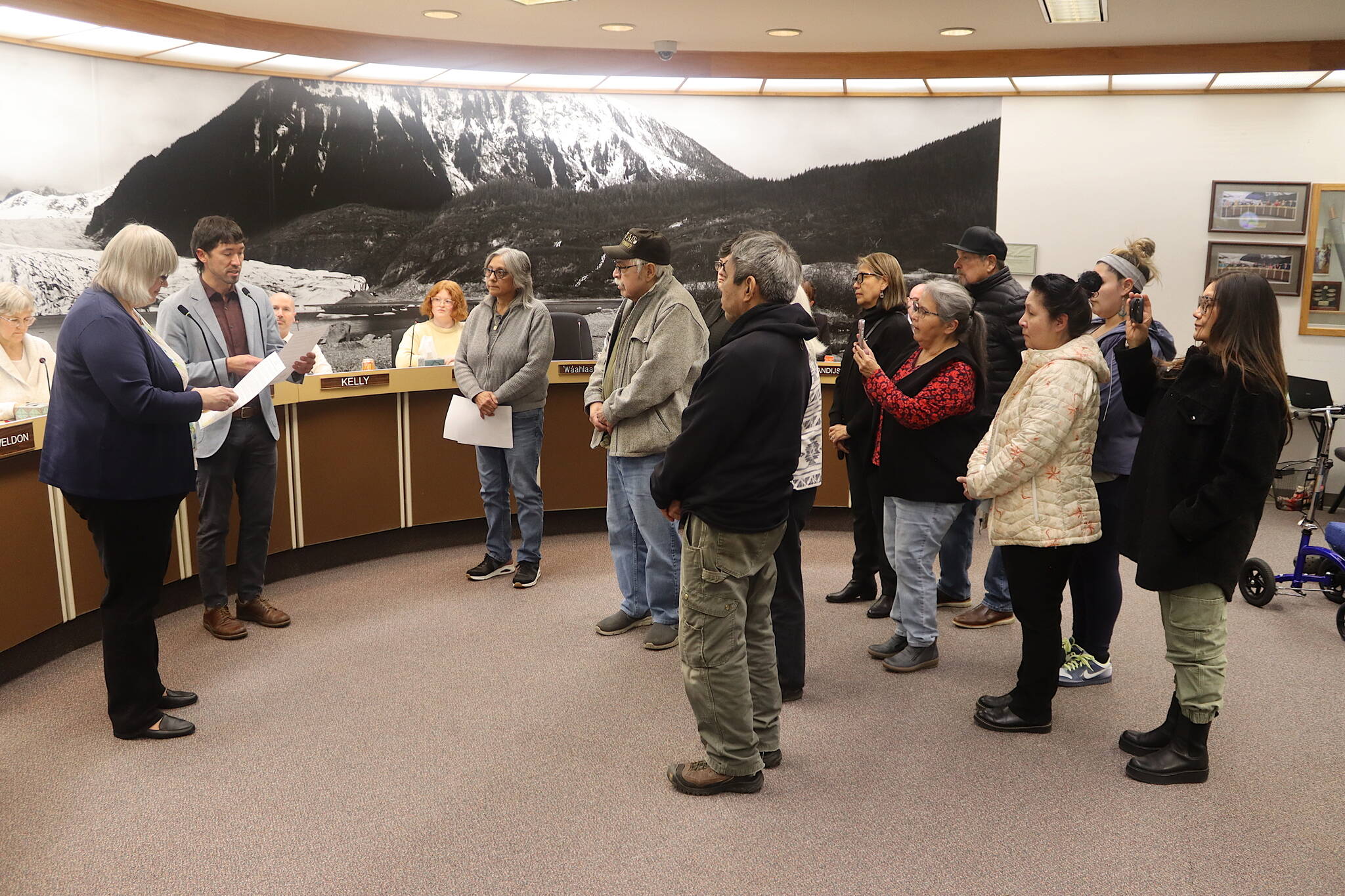A formal apology for the 1962 burning of the Douglas Indian Village, done while its residents were away by officials seeking to build a new harbor, was offered by the City and Borough of Juneau during an Assembly meeting Monday night to a local tribal council whose leader acknowledged its historical significance while stating the whole history of that incident needs to be told.
“An apology that is long overdue” was crafted by departing Assembly member ‘Waahlaal Gidaag Barbara Blake as her final action, Mayor Beth Weldon said at the opening of the meeting just before two newly elected members — one of them replacing Blake — were sworn in. Weldon and Assembly member Greg Smith, who minutes after the ceremony was elected deputy mayor in the Assembly’s post-election reorganization, read the apology to about 10 members of the Douglas Indian Association.
A narrative published by DIA, a federally recognized Tlingit tribe, states in the summer of 1962 the City of Douglas bulldozed and burned as many as 20 homes, plus other structures, to make room for a boat harbor. Residents were at a fish camp at the time, which Douglas city officials used as legal justification to condemn the buildings after decades of ongoing racial tensions and disputes.
“These actions were undertaken unilaterally, with little or no compensation to Tlingit property owners and apparently with no judicial hearing and no plan at all regarding the Natives who were to be made homeless due to the City’s actions,” the DIA narrative states. “These homes formed a Tlingit village, continuously occupied since at least the 1880s.”
The former village is now the site of Douglas Harbor and Savikko Park.
The apology read Monday declares “the decision to burn the Douglas Indian Village in 1962 involved multiple parties, including the Bureau of Indian Affairs, the State of Alaska, the City and Borough of Juneau predecessor bodies consisting of the City of Douglas, the City of Juneau, and the Greater Juneau Borough, as well as local businesses.”
City leaders are now working collaboratively with Tlingit peoples on cultural preservation and revitalization projects, making an acknowledgment of past wrongs appropriate, according to the apology read by Weldon and Smith.
“Now, therefore, the City and Borough of Juneau hereby issues this formal apology to the Tlingit people for its role in the burning of the Douglas Indian Village in 1962,” the apology concludes. “We acknowledge the pain and suffering this event has caused and commit to a path of healing and reconciliation. We pledge to work alongside the Tlingit people to build a more inclusive and respectful community, where the rights, culture, and contributions of Indigenous peoples are recognized, honored, and celebrated.”
DIA President Clarence “Butch” Laiti (center), speaking to the Assembly and others at the meeting, said “this is an important document that acknowledges something that was wrong,” but he wrestled with his feelings about the apology when he heard it was being offered.
“The problem I guess I have is the whole story is not out there,” he said. “And I believe that to make this right we have to tell the whole history of our relationship between the city of Douglas, Juneau and the Tlingit people. It goes back before the turn of the century — 1900 — and the history needs to be told. There’s so much that is not known. Our young people don’t know it.”
Among the things Laiti said he’d like to see is “a historic center that details the whole history of both sides.”
The city’s apology comes in between two historic apologies being made to Alaska Natives in two other Southeast communities. The U.S. Navy on Sept. 21 apologized for destroying the Native village of Kake in 1869 and this weekend the Navy is scheduled to offer a similar apology for the 1882 bombardment of Angoon.
• Contact Mark Sabbatini at mark.sabbatini@juneauempire.com or (907) 957-2306.

